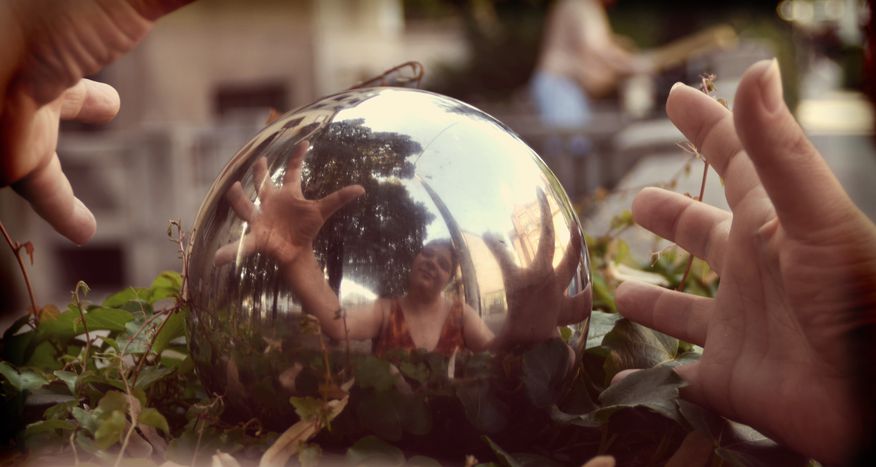
The future of Zagreb: from the stars into mud
Published on
Future happened yesterday. The only ones who still look into it with hope are idealists, dreamers and madmen. Are they the last rescue boat for humanity? In the croatian capital Zagreb I had an occasion to meet some science-fiction writers and listen to their ideas of perfect future. Curtain up for Utopia 2.0!
It was in 1971 when Sun landed just in front of National Croatian Theatre. 30 years later it was joined by Mercury, Venus, Mars, Jupiter, Saturn, Uranus, Neptun and Pluto. And obviously by our Earth, a nail-size miniature if compared with a two meters high star made of bronze.
For Mihaela Marija Perković the installation prepared by artists Ivan Kožarić and Davor Preis has become a perfect symbol of better tomorrow for whole mankind as well as a metaphore of the bumpy road leading there. In a Café found on the street Maksimirska Cesta, five minutes away from Saturn, we stop for a little break. A future without caffeine? No, thanks!
From the stars into mud
Asked about her own image of a perfect world, the artist takes some time to answer. Real utopias play in croatian Science Fiction quite a confused role - an ideal society doesn't leave a lot of space for drama. Moreover, the Balkan conflict certainly had its part in infecting the stories about future with dark atmosphere.
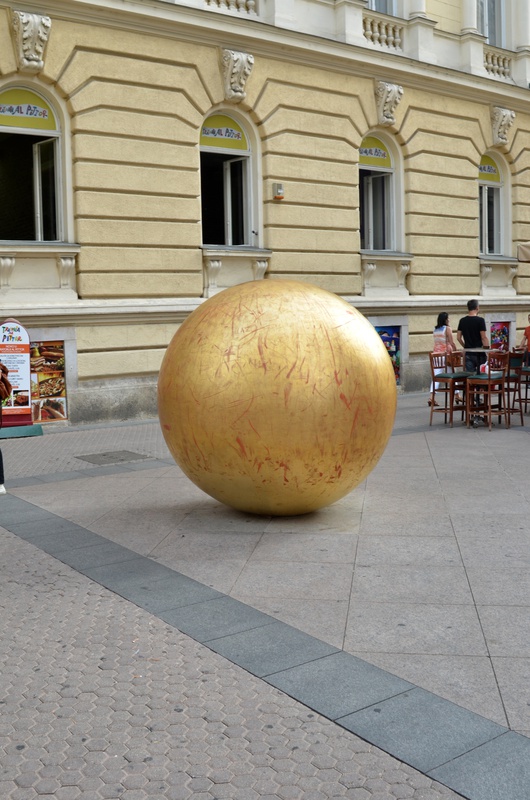 Mihaela passes me a book with black cover. Kontakt, the short stories book of croatian science fiction writers translated into english. Croatian Science-Fiction is gloomy. "She looked away from the starry and gazed the mud", I read in introduction, written by Darko Macan, who will present himself later in an e-mail as a depressed and pessimist misanthrope. I sip my coffee. Is Croatia really a suitable place to speak about better future? Our education methods have to change fundamentally", states suddenly Mihaela. Her friend and also writer Irena Rašeta nods. In their opinion learning under pressure and by memory has no future - neither in Croatia, nor anywhere else. Mihaela's school years didn't manage to wake up her interest in cosmos. This fascination came later but with double force.
Mihaela passes me a book with black cover. Kontakt, the short stories book of croatian science fiction writers translated into english. Croatian Science-Fiction is gloomy. "She looked away from the starry and gazed the mud", I read in introduction, written by Darko Macan, who will present himself later in an e-mail as a depressed and pessimist misanthrope. I sip my coffee. Is Croatia really a suitable place to speak about better future? Our education methods have to change fundamentally", states suddenly Mihaela. Her friend and also writer Irena Rašeta nods. In their opinion learning under pressure and by memory has no future - neither in Croatia, nor anywhere else. Mihaela's school years didn't manage to wake up her interest in cosmos. This fascination came later but with double force.
A DYNASTY CALLED MANKIND
Nevertheless, the technological progress plays a secondary role in the visions of Mihaela. "My stories transform during writing, taking often a feminist course", explains the writer who is also a mother. The principal message of Mihaela is to give to people a possibility to become better, unselfish and more sensitive to the others - which has as well pragmatic basis: "In the society with the number of singles growing constantly we are inevitably dependent on the help of other people." The humanity has to understand that we are a large family in which everybody has to do its part: starting from babysitting or nursing and finishing with the transfer of knowledge.
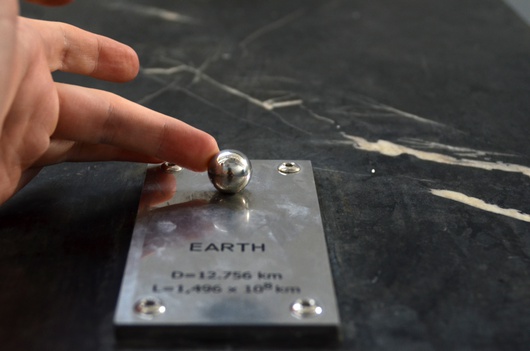 The classical model of mother and father family is in Mihaela's future only one possibility among others. "Im dreaming about a world in which all kinds of relationships would be possible and considered something natural - gay, lesbian, two, five or seven." And every each of these unions should have the right to adopt and bring up children. "Here in Croatia there is a lot of abandoned children, whereas the adoption process can last even 10 years", she complains. To sum up, my utopia is a mix between the idealistic hippie world of 70s, grounded in urban, futurist surroundings, with the respect for technology with its advantages and the access to free education for everybody."
The classical model of mother and father family is in Mihaela's future only one possibility among others. "Im dreaming about a world in which all kinds of relationships would be possible and considered something natural - gay, lesbian, two, five or seven." And every each of these unions should have the right to adopt and bring up children. "Here in Croatia there is a lot of abandoned children, whereas the adoption process can last even 10 years", she complains. To sum up, my utopia is a mix between the idealistic hippie world of 70s, grounded in urban, futurist surroundings, with the respect for technology with its advantages and the access to free education for everybody."
Irena judges that this kind of future is possible only if we help it to appear ourselves, even if taking not fully legal steps: "I will invent a drug which will make people take care of each other. I will add it to ground water so that everybody has contact with it" says 34 years old laughing. "We have forgotten how to think independently. Children also have to learn to question the authorities!"
a touch of apocalypse
Questioning authorities is the speciality of Aleksandar Žiljaks. This 50 years old co-editor of sci-fi anthology Ubiq had already been writing about future long time before I was born. Some of his short stories have been even translated and published in german, polish and english magazines. Including Ultramarine, the favorite story of Aleksander. I meet this dinosaur of croatian croatian Science-Fiction in an open-air bar in the garden of Archeological Museum. Ausgerechnet. Exactly there. Beer is cool and music is swaying around.
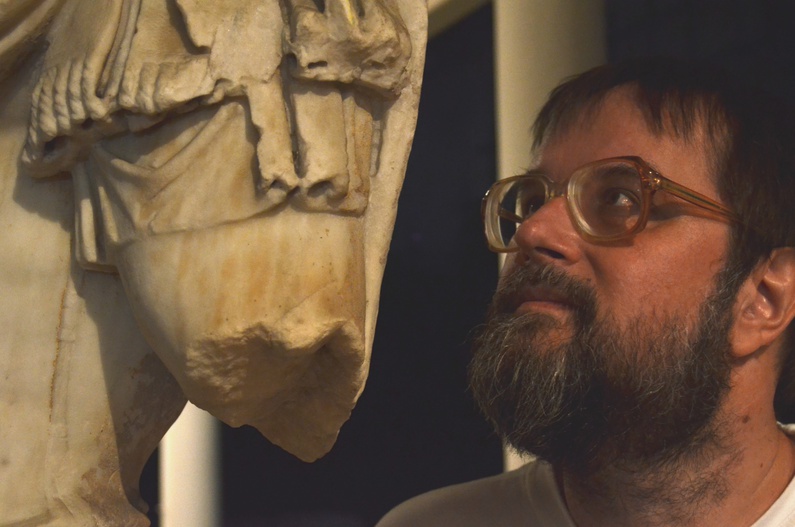 Everything is clear quite fast: Aleksandar shows tendency to fatalism and gallows humour. He starts to outline in front of me his personal version of utopia, from which emerges an image of total collapse, very probable in his opinion. However, his visions are not that distant from those of Mihaela and Irena. Aleksandar's city is supposed to be first of all green. An enourmous park where private cars are prohibited. Cars should be replaced by an extended web of public transport which would facilitate moving all around the city.
Everything is clear quite fast: Aleksandar shows tendency to fatalism and gallows humour. He starts to outline in front of me his personal version of utopia, from which emerges an image of total collapse, very probable in his opinion. However, his visions are not that distant from those of Mihaela and Irena. Aleksandar's city is supposed to be first of all green. An enourmous park where private cars are prohibited. Cars should be replaced by an extended web of public transport which would facilitate moving all around the city.
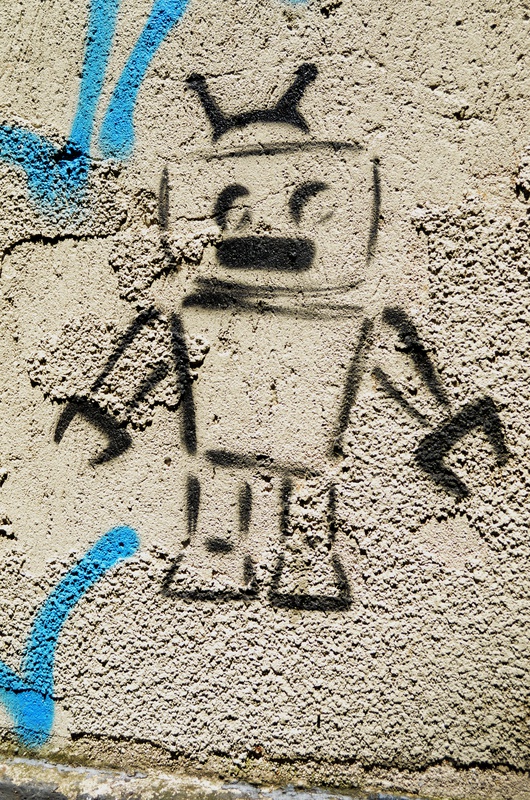 "The milliards of people are not able to survive at the Earth where some nations continue to have agriculture typical for 17th century", assures Aleksandar. The water and electricity should be supplied in to everybody by local power stations, governed by city's community. "The privatization of these sectors of economy is just idiotic and extremely dangerous!" warns my interlocutor, critisizing the capitalism and the politics of his country at the same time. "During 20 years we have been privatizing everything possible in Croatia and where has it led us? The majority of factories are closed and their employees dismissed." It's hard to interrupt Aleksandar's flow of words. "We have an army of unemployed not because of war but due to mismanagement of ouur national economy!" In the future the combination of private and public property should keep the economy in balance. The places of public benefit would be accesible for whole community and the objects of everyday use could be produced at home thanks to the advanced technology of 3D-Printer. Sort of Socialism 2.0.
"The milliards of people are not able to survive at the Earth where some nations continue to have agriculture typical for 17th century", assures Aleksandar. The water and electricity should be supplied in to everybody by local power stations, governed by city's community. "The privatization of these sectors of economy is just idiotic and extremely dangerous!" warns my interlocutor, critisizing the capitalism and the politics of his country at the same time. "During 20 years we have been privatizing everything possible in Croatia and where has it led us? The majority of factories are closed and their employees dismissed." It's hard to interrupt Aleksandar's flow of words. "We have an army of unemployed not because of war but due to mismanagement of ouur national economy!" In the future the combination of private and public property should keep the economy in balance. The places of public benefit would be accesible for whole community and the objects of everyday use could be produced at home thanks to the advanced technology of 3D-Printer. Sort of Socialism 2.0.
education for every child
Ok then, but what we are going to do with millions of enemployed? In the opinion of the author only 20 Percent of population can get a better, more creative job, whereas the majority can't develop its potential due to poor conditions in which they were brought up. "For the present generation it's already too late, so we have to invest in our children." Only by means of global education web it would be possible to ensure an equal access to education for every child, no matter if born in Africa, USA, Asia or Europe.
Aleksandar is quite sure that means necessary for achieving his utopia lie not far away from us. Looking from technical point of view. The only problem consists in the way politics are carried out and in attitudes of the heads of governments: "The present system has no interest in a fair distribution of planet resources." In such case maybe a restart of the system is inevitable? Should we wait for a total collapse to be able to build a new, better world from the ashes of the present one? As the answer for my question i get a furious look: "These ashes will be radioactive. The next war and its consequences will put us back to Middle Ages!" Longing for a war to establish a new future is just a total bullshit. "Who of these people knows how is it when one is going to be shot or has to march 50 kilometers fully armed? Not to mention the knowledge how to milk a cow? Nothing good has ever emerged from total chaos!"
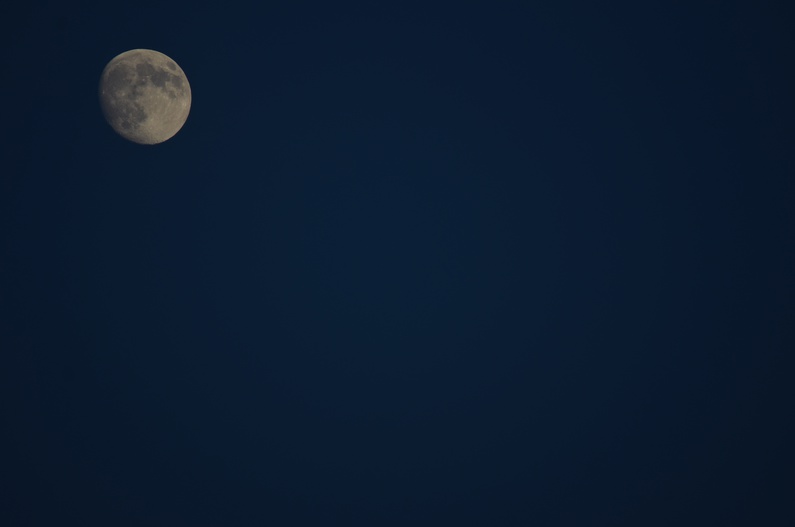 This article is a part of a series of reportages called EUtopia on the ground, which every months tries to ask a question about the future of Europe. This cafébabel project is co-financed by European Comission in the context of cooperation with french Foreign Affairs Ministry, as well as with Fondation Hippocrène and fondation of Charles Léopold Mayer.
This article is a part of a series of reportages called EUtopia on the ground, which every months tries to ask a question about the future of Europe. This cafébabel project is co-financed by European Comission in the context of cooperation with french Foreign Affairs Ministry, as well as with Fondation Hippocrène and fondation of Charles Léopold Mayer.
Translated from Zukunftsvisionen in Zagreb: Von den Sternen in den Matsch



